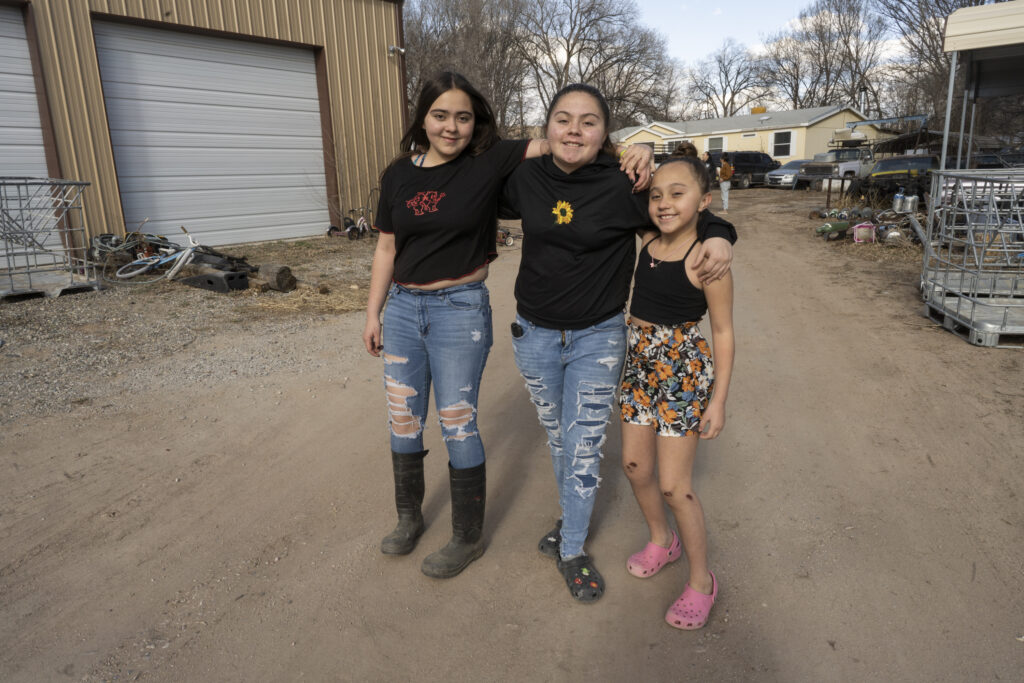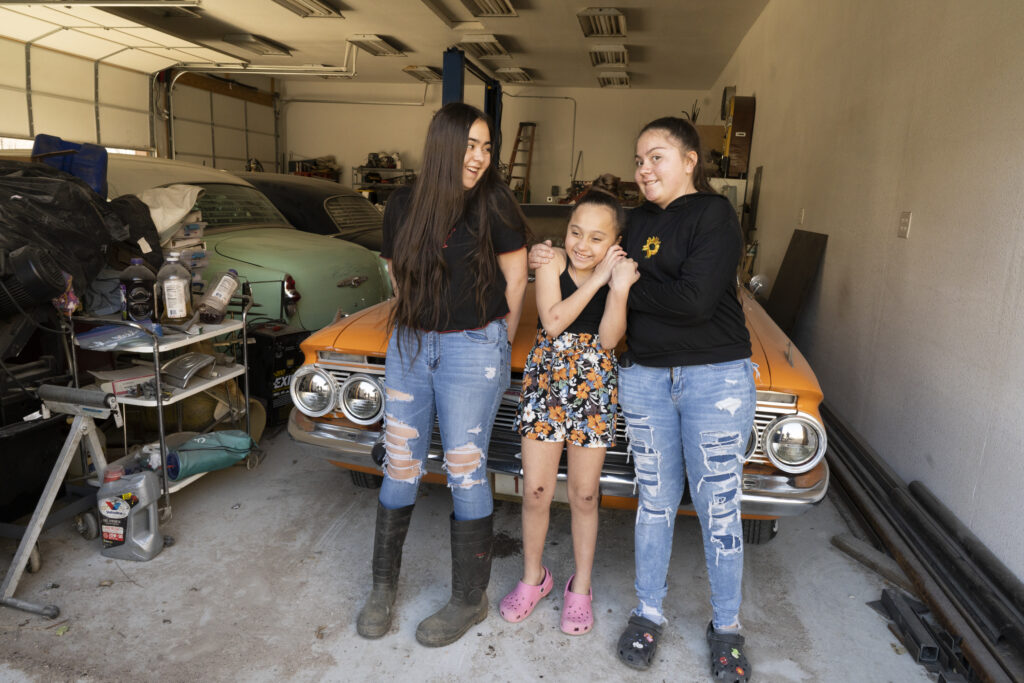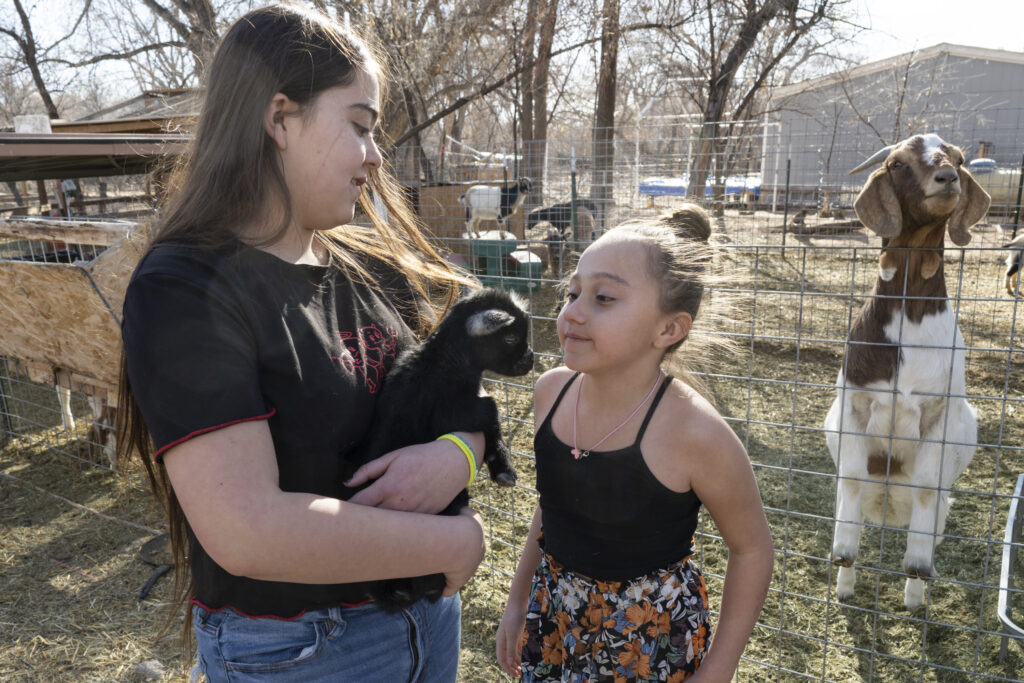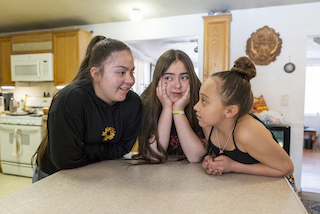By Alicia Inez Guzmán | Searchlight NM
Photography by Don J. Usner
This is the second in a series of articles that ask students in New Mexico how they feel about school during the pandemic. Today we hear from three sisters in Chimayó. These comments have been lightly edited.
The front yard is filled with old cars, almost too many to count — several Chevy hardtop and convertible Impalas, a dusty Volkswagen Beetle and a Chevy Deluxe, to name just a few, each in either a state of decay or rebirth. Angel, Heaven and Bobbie Chacon, who all live in Chimayó, claim at least one among the bunch as their “own” — the car they hope to drive in a lowrider show one day. Bobby Chacon, the girls’ father, is a renowned lowrider and co-founder of Los Guys Car Club, who for years has “rebuilt cars from the ground up.” His family compound, located off an arroyo, is half showroom, half storage.
Angel, 14, attends Carlos F. Vigil Middle School and her sisters, Heaven, 11, and Bobbie, 9, are students at James H. Rodriguez Elementary School, all in nearby Española.

Early last spring, Heaven recalls wishing “for school to shut down.” Now she says, “all we wanna do is go back.”
“It’s been kind of boring,” Bobbie says of online school.
Angel, an eighth-grader, adds that “most of the time we have our cameras off,” which means she can’t even see her classmates’ faces.
And all three girls are tired of listening to teachers and classmates struggling with the Google Chromebooks they received from the school district. Even now, a year after the switch to online learning, “The teacher is always trying to teach other students how to log in,” Heaven says.
It’s not uncommon for her to see other students’ family members walk around in the background or hear music playing during lessons. Her fellow fifth-graders already have trouble paying attention, and the distractions make things even harder. The pranks get old, too. “Other kids from other grades are always trying to get into our classes. All you need is a code.”
With an arch smile, Heaven imitates how one teacher tries to get kids to behave: “I’ll call your name three times and if you don’t answer then I’m gonna kick you out!”

Angel, the shyest of the sisters, adds that “It’s harder to ask for help in online school. I would rather email my teacher afterward than to ask her during the meeting.” On good days, she estimates there are 20 students in her class. On other days, maybe 14 will show.
Her favorite class is “civil air patrol, a military science course, because we actually get to talk to each other. Every class, the teacher asks us to tell him something good about our day.”
Like her sisters, Heaven is more interested in life outside of school, on a small farm at their uncle Armando’s house, down the road. Even before the pandemic, the girls’ father began assembling the farm there. When the internet at the Chacon house couldn’t handle all the girls logging in at the same time for school, Heaven and Angel began spending the week at their uncle’s, where there was more bandwidth. As the pandemic dragged on, Bobby Chacon expanded the farm into a sprawling compound, with goats, pigs, pheasants, turkeys, ducks, rabbits and chickens roaming among a thicket of unruly pens. Pam Jaramillo, the girls’ mom, says her daughters “didn’t even know what was going on with the pandemic after that, because they were so busy with the animals.”
“Being in school all day is hard because there is less time to feed the animals,” Angel says. It’s a full day, “from 7:55 to 3:00,” but afterward, when she steps outside her uncle’s doublewide, the farm is but feet away. “My favorite animals are the goats.”
Heaven echoes those sentiments: “I like to do my homework right away, then eat, watch TV and feed the animals.” On a recent day at the farm, she makes a beeline to one brown-and-grey baby goat. “This one is Karen,” she announces, holding the kid in her arms like an infant.
Bobbie, a third-grader, also feeds the baby chicks, tiny fluff balls scuttling around a homemade pen in the Chacon’s sunroom. She picks one up and points out the incubator where rows of eggs bask under yellow fluorescent bulbs. Her mom, standing nearby, spots a chick in the middle of hatching.
The coronavirus has been almost universally challenging for mothers of young children, but for Pam, it hit particularly close to home. Despite being careful, all five members of the family got COVID-19, each suffering a different symptom. They recovered quickly, “except for me,” says Pam, a two-time cancer survivor. “I was out of breath for a month and a half.”

For the children, the main stress has been school. Amid the haze of online learning, PE stands out: Students find workouts on YouTube and share them with the class. Bobbie likes to do the exercises alone in the kitchen, usually a combination of “jumping jacks and running in place.” Other than that, the particulars of classes are elusive. Math, she describes as “one little website thing.” And her classmates? “I can’t remember a few of their names.”
Mostly, Bobbie says, laughing, “I like to eat while I’m in class,” a novelty that wasn’t allowed in the school building.
Other than that, what did she like about remote learning?
“Nada.”
Alicia Inez Guzmán Raised in the northern New Mexican village of Truchas, Alicia Inez Guzmán has written about histories of place, identity, and land use in New Mexico. She brings this knowledge to her current role as education reporter at Searchlight, where she focuses on the lived experiences of New Mexico’s students and the role that equity and cultural literacy should play in the classroom and educational policymaking. The former senior editor of New Mexico Magazine, Alicia holds a Ph.D. in Visual and Cultural Studies from the University of Rochester in New York.
